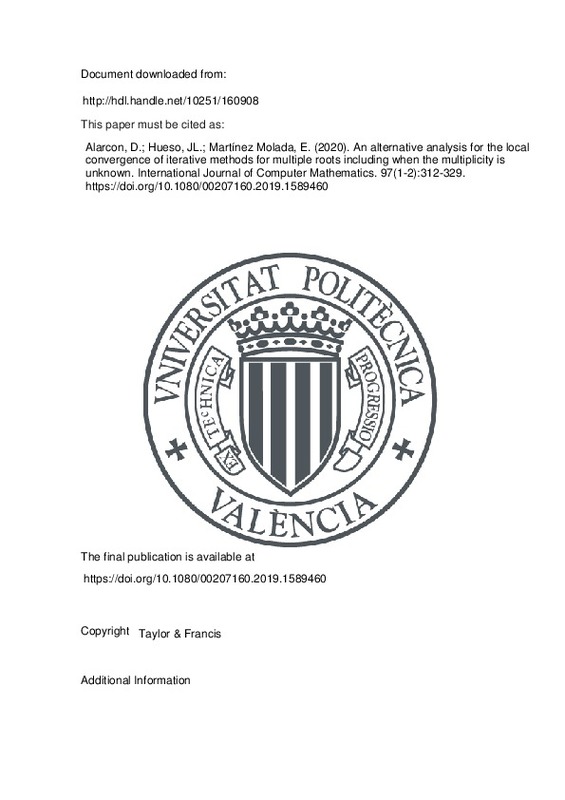JavaScript is disabled for your browser. Some features of this site may not work without it.
Buscar en RiuNet
Listar
Mi cuenta
Estadísticas
Ayuda RiuNet
Admin. UPV
An alternative analysis for the local convergence of iterative methods for multiple roots including when the multiplicity is unknown
Mostrar el registro sencillo del ítem
Ficheros en el ítem
| dc.contributor.author | Alarcon, Diego
|
es_ES |
| dc.contributor.author | Hueso, Jose L.
|
es_ES |
| dc.contributor.author | Martínez Molada, Eulalia
|
es_ES |
| dc.date.accessioned | 2021-02-09T04:32:26Z | |
| dc.date.available | 2021-02-09T04:32:26Z | |
| dc.date.issued | 2020-02-01 | es_ES |
| dc.identifier.issn | 0020-7160 | es_ES |
| dc.identifier.uri | http://hdl.handle.net/10251/160908 | |
| dc.description.abstract | [EN] In this paper we propose an alternative for the study of local convergence radius and the uniqueness radius for some third-order methods for multiple roots whose multiplicity is known. The main goal is to provide an alternative that avoids the use of sophisticated properties of divided differences that are used in already published papers about local convergence for multiple roots. We defined the local study by using a technique taking into consideration a bounding condition for the derivative of the function with i=1,2. In the case that the method uses first and second derivative in its iterative expression and i=1 in case the method only uses first derivative. Furthermore we implement a numerical analysis in the following sense. Since the radius of local convergence for high-order methods decreases with the order, we must take into account the analysis of ITS behaviour when we introduce a new iterative method. Finally, we have used these iterative methods for multiple roots for the case where the multiplicity m is unknown, so we estimate this factor by different strategies comparing the behaviour of the corresponding estimations and how this fact affect to the original method. | es_ES |
| dc.description.sponsorship | This work was supported by Secretaria de Educacion Superior, Ciencia, Tecnologia e Innovacion (Convocatoria Abierta 2015 fase II). | es_ES |
| dc.language | Inglés | es_ES |
| dc.publisher | Taylor & Francis | es_ES |
| dc.relation.ispartof | International Journal of Computer Mathematics | es_ES |
| dc.rights | Reserva de todos los derechos | es_ES |
| dc.subject | Nonlinear equations | es_ES |
| dc.subject | Iterative methods | es_ES |
| dc.subject | Multiple roots | es_ES |
| dc.subject | Convergence ball | es_ES |
| dc.subject | Local convergence | es_ES |
| dc.subject | Nonlinear algebraic or transcendental equations | es_ES |
| dc.subject.classification | MATEMATICA APLICADA | es_ES |
| dc.title | An alternative analysis for the local convergence of iterative methods for multiple roots including when the multiplicity is unknown | es_ES |
| dc.type | Artículo | es_ES |
| dc.identifier.doi | 10.1080/00207160.2019.1589460 | es_ES |
| dc.relation.projectID | info:eu-repo/grantAgreement/GVA//PROMETEO%2F2016%2F089/ES/Resolución de ecuaciones y sistemas no lineales mediante técnicas iterativas: análisis dinámico y aplicaciones/ | es_ES |
| dc.relation.projectID | info:eu-repo/grantAgreement/AEI/Plan Estatal de Investigación Científica y Técnica y de Innovación 2017-2020/PGC2018-095896-B-C22/ES/DISEÑO, ANALISIS Y ESTABILIDAD DE PROCESOS ITERATIVOS APLICADOS A LAS ECUACIONES INTEGRALES Y MATRICIALES Y A LA COMUNICACION AEROESPACIAL/ | es_ES |
| dc.rights.accessRights | Abierto | es_ES |
| dc.contributor.affiliation | Universitat Politècnica de València. Departamento de Matemática Aplicada - Departament de Matemàtica Aplicada | es_ES |
| dc.description.bibliographicCitation | Alarcon, D.; Hueso, JL.; Martínez Molada, E. (2020). An alternative analysis for the local convergence of iterative methods for multiple roots including when the multiplicity is unknown. International Journal of Computer Mathematics. 97(1-2):312-329. https://doi.org/10.1080/00207160.2019.1589460 | es_ES |
| dc.description.accrualMethod | S | es_ES |
| dc.relation.publisherversion | https://doi.org/10.1080/00207160.2019.1589460 | es_ES |
| dc.description.upvformatpinicio | 312 | es_ES |
| dc.description.upvformatpfin | 329 | es_ES |
| dc.type.version | info:eu-repo/semantics/publishedVersion | es_ES |
| dc.description.volume | 97 | es_ES |
| dc.description.issue | 1-2 | es_ES |
| dc.relation.pasarela | S\387554 | es_ES |
| dc.contributor.funder | Generalitat Valenciana | es_ES |
| dc.contributor.funder | Agencia Estatal de Investigación | es_ES |
| dc.contributor.funder | Secretaría de Educación Superior, Ciencia, Tecnología e Innovación, Ecuador | es_ES |
| dc.description.references | Argyros, I. (2003). On The Convergence And Application Of Newton’s Method Under Weak HÖlder Continuity Assumptions. International Journal of Computer Mathematics, 80(6), 767-780. doi:10.1080/0020716021000059160 | es_ES |
| dc.description.references | Hueso, J. L., Martínez, E., & Teruel, C. (2014). Determination of multiple roots of nonlinear equations and applications. Journal of Mathematical Chemistry, 53(3), 880-892. doi:10.1007/s10910-014-0460-8 | es_ES |
| dc.description.references | McNamee, J. M. (1998). A comparison of methods for accelerating convergence of Newton’s method for multiple polynomial roots. ACM SIGNUM Newsletter, 33(2), 17-22. doi:10.1145/290590.290592 | es_ES |
| dc.description.references | Ortega, J. M. (1974). Solution of Equations in Euclidean and Banach Spaces (A. M. Ostrowski). SIAM Review, 16(4), 564-564. doi:10.1137/1016102 | es_ES |
| dc.description.references | Osada, N. (1994). An optimal multiple root-finding method of order three. Journal of Computational and Applied Mathematics, 51(1), 131-133. doi:10.1016/0377-0427(94)00044-1 | es_ES |
| dc.description.references | Schr�der, E. (1870). Ueber unendlich viele Algorithmen zur Aufl�sung der Gleichungen. Mathematische Annalen, 2(2), 317-365. doi:10.1007/bf01444024 | es_ES |
| dc.description.references | Vander Stracten, M., & Van de Vel, H. (1992). Multiple root-finding methods. Journal of Computational and Applied Mathematics, 40(1), 105-114. doi:10.1016/0377-0427(92)90045-y | es_ES |
| dc.description.references | Zhou, X., Chen, X., & Song, Y. (2013). On the convergence radius of the modified Newton method for multiple roots under the center–Hölder condition. Numerical Algorithms, 65(2), 221-232. doi:10.1007/s11075-013-9702-2 | es_ES |







![[Cerrado]](/themes/UPV/images/candado.png)

